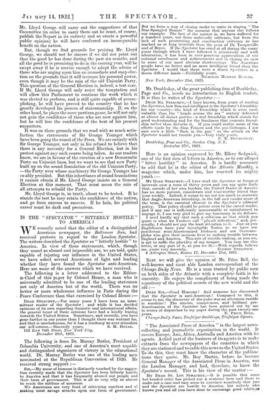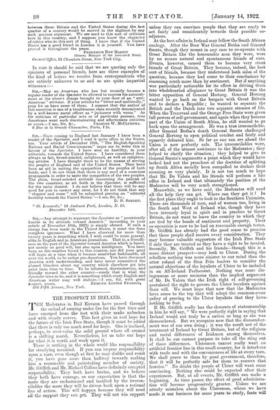IS THE " SPECTATOR " " BITTERLY HOSTILE " TO
AMERICA ?
WE recently noted that the editor of a distinguished American newspaper, the Baltimore Sun, had received protests in regard to the London Spectator. The writers described the Spectator as " bitterly hostile " to America. In view of these statements, which, though they sound so absurd and impossible are, we are told, quite capable of injuring our influence in the United States, we have asked several Americans of light and leading whether they have found the Spectator anti-American. Here are some of the answers which we have received. The following is a letter addressed to the Editor- In-Chief of this paper by Colonel House, a man who is universally admitted to be one of the leading statesmen not only of America but of the world. There was no better or more wholesome influence in Paris during the - Peace Conference than that exercised by Colonel House :— DEAR STTIACHEY,—For many years I have been all inter. mittent reader of the Spectator ; and while it has decided opinions of its own regarding domestic and international affairs, tho general tenor of these opinions have had a kindly leaning towards the United States. Sometimes, and recently, you have gone further in our praise than I thought there was warrant for, and that is unwholesome, for it has a tendency to over-stimulate our self-esteem.—Sincerely yours, S. M. HOD-SE. 112 East 74th .Street, New York City.
• December 28th, 1921.
The following is from Dr. Murray Butler, President of Columbia University, and one of America's most capable And distinguished organizers of victory in the educational world. Dr. Murray Butler was one of the leading men nominated at the Republican Convention of 1920. He received strong support :- SIR,—My sense of humour is distinctly touched by the sugges- tion recently made that the Spectator has been bitterly hostile to America and that it has frequently abused our people and their form of government. This is all so very silly as almost to reach the sublime of nonsense.
We Americans are very fond of criticizing ouselves and of .1x:taking most savage attacks upon our form of government. But we have a way of closing ranks to unite in singing " The Star-Spangled Banner " the moment that anyone else follows our example. The fact of the matter is, we have suffered for a hundred years, not from unfriendly criticism, but from the lack of such penetrating and constructive criticism as has reached us at long intervals from the pens of De Tocqueville and of Bryce. If the Spectator has erred at all during the many years through which I have followed it attentively and with admiration, it has been in over-generous appreciation of our national excellences and achievements and in closing its eyes to some of our most obvious shortcomings. The American people have no better and no more intelligent friend than the Spectator. I would that there were a dozen Spectators in a dozen different lands.—Faithfully yours, NICHOLAS MURRAY BUTLER. New York, December 21st, 1921.
Mr. Doubleday, of the great publishing firm of Doubleday, Page and Co., needs no introduction to English readers. It is thus he writes of the Spectator :- DEAR MR. STRACHEY,—I have known, from years of reading the Spectator, how firm and intelligent is the Spectator's friendship for our country—the kind of friendship which is oven more valuable than the " hands across the sea " oratory delivered at almost all dinner parties—a real friendship which stands for good understanding and for the frankness that cements friend- ship rather than disturbs it. If you could realize some of the efforts made by the Sinn Feiners and the pro-Germans, I am sure such a little " flash in thepan " as the attack on the Spectator would not trouble you.—Very truly yours, F. N. DOUBLEDAY. Doubleday, Page and Co., Garden City, N.Y.
December 27th, 1921.
Here is an opinion expressed by Mr. Ellery Sedgwick, one of the first men of letters in America, as to our alleged " bitter hostility " to America. It is hardly necessary to add that he is the editor of the Atlantic Monthly, a magazine which, under him, has renewed its mighty youth :- MY DEAR STRACHEY,—I have read the Spectator at frequent intervals over a term of thirty years and can say quite flatly that, outside of her own borders, the United States of America has no more patient, considerate and trustworthy friend than your weekly. Indeed, it seems to me not too much to maintain that Anglo-American friendship, in the full and candid sense of the term, is the essential element in the Spectator's editorial policy. That policy should be patent even to the casual reader, and if any one is sufficiently unreasonable or misinformed to impugn it, I am very glad to give my testimony in its defence. I need hardly say that such a criticism as that which you quote is what we Yankees call " plumb ridiculous," and, per- sonally, I should not pay the least attention to it. Just as you Englishmen have your incorrigible Tories, so we have our pestiferous semi-Americanized Irishmen and our Germano- philes who give their noxious lives to making trouble between England and America. This sort of trouble-making, as you see, is apt to ruffle the placidity of my temper. You may use this letter, or any part of it, as you see fit.—With regards, believe me, yours very sincerely, ELLER,/ SEDOWICIL 8 Arlington Street, Boston 17, December 21st, 1921.
Next we will give the opinion of Mr. Price Bell, the well-known and most able London correspondent of the Chicago Daily News. He is a man trusted by public men on both sides of the Atlantic with a complete faith in his sincerity. He enjoys the compliment of being made the repository of the political secrets of the new world and the old :— DEAR SIR,—Good Heavens ! And someone has discovered that tho Spectator is anti-American ! Compared to this, it seems to me, the discovery of the poles was an afternoon ramble in sunshine ! The sincere, conspicuous, and brilliant pro- Americanism of the Spectator has been pointed out by me in scores of dispatches to my paper during the past twenty-one years. E. PRICE BELL. Chicago Daily News, Trafcegar Buildings, Trafalgar Square.
" The Associated Press of America " is the largest news- collecting and journalistic organization in the world. It covers Europe, Asia, Africa, Australia and America with its agents. A chief part of the business of its agents is to make extracts from the newspapers of the countries in which they are stationed and to cable this news to the United States. To do this, they must know the character of the publica- tions they quote. Mr. Roy Martin, before he became General Manager of the Associated Press in America, was the London Manager, and had, therefore, to know the Spectator's record. This is his view of the matter :- MY DEAR ST. Lox STRACHEY,—It iB possible that some hot-headed critic has picked out a sentence hero and there to make out a case and may seem to convince somebody that you and the Spectator are hostile to America, but nobody who knows you and all you have done to encourage good relaticas between Great Britain and the United States during the. last quarter of a century would be moved in the slightest _by any such t pecious argument. We are used to this sort of criticism here in this country, and I suppose you know the character of critics who do this sort of thing. I know that if the United States has a ,goocl friend in London it is yourself. You. have proved it throughout the .years.
FREDERICK ROY MARTIN
(Genera Manager of the Associated Prow). General Office, 51 Chambers Street, New. York City.
In case it should be said that we are quoting only the opinions of personal friends, here are three examples of the kind of letters we receive from correspondents who are entirely unknown to us and so are quite impartial witnesses :— SIR,—May an A Tnerutan who has but recently become a regular reader of the $ytectator be allowed to express his astonish- ment at the absurd charge brought to your door of an " anti- American " attitude. If your articles be " bitter and unfriendly," pray let us have..more. of them. I suspect that the author of this assertion is one Of a troublesome class recently denominated by a well-known naval .officer as " jackasses with votes." As for criticism of particular acts or of particular persons, true Americans want such discriminating and affectionate criticism as yours.-1 am, Sir, &c., CHARLES W. MeCrustena.. 8 Rue de /a Grande Chaumiere, Paris, Vie.
SIR,—Since coming telEngland last January I have been a reader of the Spectator, and I read it quite often in the States, too. Your article of December 10th, " The English-Speaking Nations and Racial Consciousness," urges me to write this in favour of the Spectator. I have seen no hostility, in your editorials, towards the United States. I have considered them always as fair, broad-minded, enlightened, as well as enlighten- ing articles. I have thought them to be the means of serving the peoples of England and of the United States. They have been an aid in uniting the sympathies of the peoples of both lands, and I do not think that there is any need of a conscious propaganda in order to unite tthe sympathies of the two peoples. The plain, broad-minded attitude concerning the policies of the two countries, as sot forth in the Spectator, is sufficient for the unity desired. I do not believe that there will ho any need for you to correct any error, for I do not think that any " chapter and verse " will be submitted proving an " editorial hostility towards the United States."—I am, Sir, &c.,
D. B. SORDEN.
"St. Leonardo," 19 Amhurst Park, London, N. 16. December 14th.
SIR,—Any attempt to represent the Spectator as " persistently hostile in its attitude toward America " (according to your article of December 10th, 1921) is simply absurd. If such a charge has been made in the United States, it must rise from complete ignorance. What I have observed for more than twenty years is something which I wish could be more general, alike in English_and in American journalism. That is, a friendli- ness on the part of the Spectator toward America which is based, not merely on good will, but also upon intelligence. You have been no fair-weather friend to this country, nor did your good will begin at a time when it became somewhat fashionable, all over the world, to be rather pro-American. You have discussed America with -understanding, and have never committed- the absurd blunders about my country which elsewhere get into print from- time to time. To be informed, discriminating, and friendly toward the other country—surely that is what the Spectator tries to be, and it is something which every English and American writer may well imitate.—I am, Sir, with great



































 Previous page
Previous page